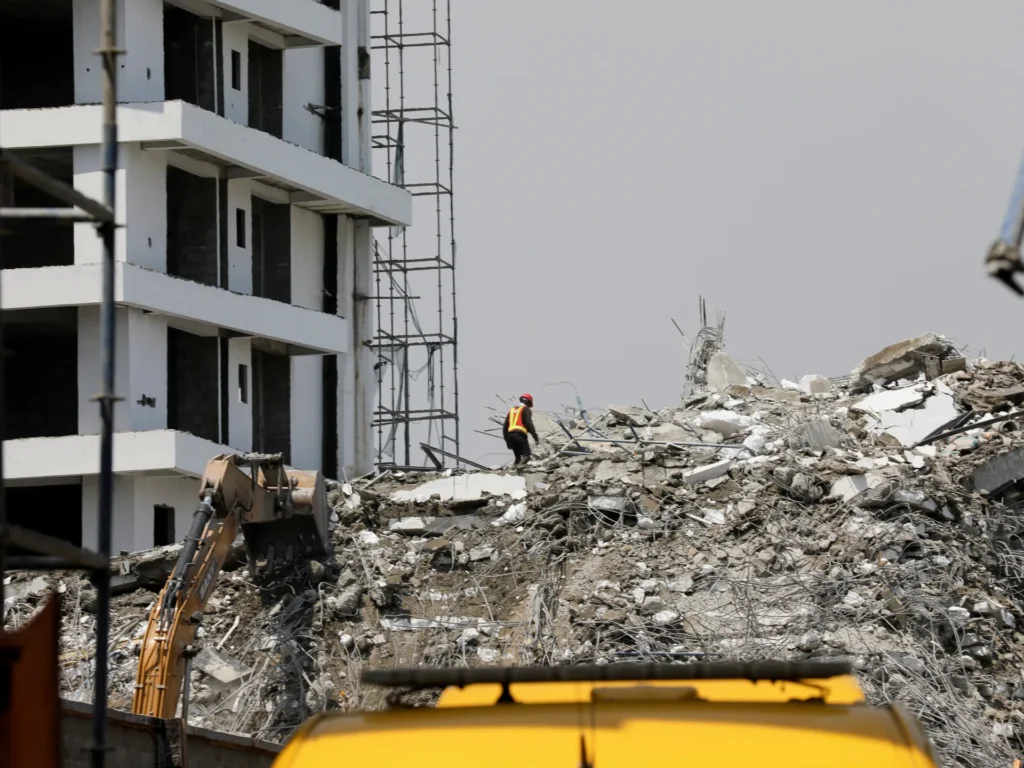From Isaac Anumihe, Abuja
Worried by the spate of building collapses in Nigeria, Minister of Housing and Urban Development, Architect Ahmed Musa Dangiwa, Wednesday, June 18, inaugurated an expanded Ministerial Task Team on building collapse in Nigeria.
The expanded task team comprises representatives of key professional bodies and regulatory agencies in the built environment, as well as professional staff of technical departments of the ministry.
The professional bodies and regulatory agencies included in the task team are the Architects Registration Council of Nigeria (ARCON), Council for the Regulation of Engineering in Nigeria (COREN), Quantity Surveyors Registration Board of Nigeria (QSRBN), Town Planners Registration Council of Nigeria (TOPREC), Surveyors Council of Nigeria (SURCON), and Estate Surveyors and Valuers Registration Board of Nigeria (ESVARBON). Others are the Council of Registered Builders of Nigeria (CORBON) and the Building Collapse Prevention Guild (BCPG).
Dangiwa frowned at the alarming frequency of building collapse incidents in Nigeria, describing it as unacceptable and a national embarrassment.
“These avoidable tragedies have led to the painful loss of innocent lives, permanent disability for survivors, destruction of property, and irreparable psychological trauma for families,” he lamented.
Expressing the eagerness of the government to end the menace, the minister stated that he had earlier, in 2024, approved the constitution of a committee on building collapses in Nigeria to examine the root causes of the problem and propose practical and sustainable solutions.
He informed that the committee, under the leadership of Architect Maji Liberty Alkali, submitted its report, proposing 18 key recommendations.
Dangiwa further informed that he subsequently directed that the committee be expanded to include key regulatory and professional bodies in the built environment, to allow for a broad-based implementation, pointing out that the issue of building collapse was not the responsibility of any one profession but a deeply interconnected challenge that cuts across architecture, engineering, quantity surveying, town planning, land surveying, among others.
Underscoring the relevance of the expanded committee, the minister stressed the need for a holistic approach and collaboration across all professions in the building process.
He remarked that architects must ensure that designs meet safety standards. Engineers, he said, must guarantee that structural calculations are sound; quantity surveyors must confirm that costs and material specifications align; builders must execute construction with integrity, and more.
The terms of reference for the reconstituted committee include examining the 18 approved recommendations and advising the ministry on phased and effective strategies for their implementation, developing a comprehensive roadmap for addressing systemic, technical, legal, and institutional challenges associated with building collapses.
Others, according to the Minister, are proposing national legislation to strengthen effective oversight of the federal government on construction, as well as designing a compliance checklist and framework for regulatory and professional bodies to enhance oversight, promote accountability, and ensure adherence to standards and ethics in building and approvals.
Dangiwa reaffirmed the ministry’s commitment to support the committee’s work.
“I have directed the permanent secretary to ensure that the necessary resources and coordination mechanisms are put in place to enable you to deliver on your mandate.
“Once your roadmap and action plan are submitted, I will work closely with relevant arms of government, both at the federal and sub-national levels, to ensure the seamless implementation of your recommendations. We will also explore the possibility of integrating key aspects of your work into national housing and urban development policies and regulations,” he further added.
Earlier, the Permanent Secretary, Ministry of Housing and Urban Development, Dr Shuaib Belgore, expressed gratitude to the committee members for honouring the call to service, acknowledging their diverse expertise and institutional experience, which is crucial to achieving the committee’s terms of reference.
“As you are inaugurated today, we look forward to the emergence of a clear roadmap for strengthening structural integrity, enforcement, professional ethics, and accountability across the building and construction value chain. Let this committee be remembered not just for diagnosing problems, but for driving change that saves lives and secures infrastructure,” he charged.
Meanwhile, the Chairman, Architect Umaru Usman Karaye, representing the Architects Registration Council of Nigeria (ARCON), expressed profound gratitude for the honour of being appointed as members of the building collapse committee.
He thanked the minister for his efforts to address the long-standing, disturbing issue which the committee has been constituted to tackle, as well as the Minister of State and the Permanent Secretary for their supporting roles.
Usman Karaye equally appreciated the various professional regulatory bodies for nominating their members to serve, emphasising the importance and urgency of the assignment and expressing commitment to working with all stakeholders.
Accordingly, he conveyed the excitement of the committee to collaborate and find a comprehensive solution to the embarrassing incidences of building collapses in the country, looking forward to a close working collaboration with the management of the ministry to immediately address the challenge.


